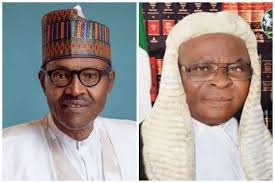- As suspension creates constitutional crisis
President Muhammadu Buhari has continued to mount pressures on Justice Walter Onnoghen, the suspended Chief Justice of Nigeria (CJN), to formally resign from office. Part of the plots to forcefully get the suspended CJN out of office is the use of the Economic and financial Crimes Commission (EFCC) to harass and intimidate Justice Onnoghen into throwing in the towel and pave the way for the President to appoint a substantial CJN to head the judiciary.
National Daily investigations revealed that President Buhari has discovered that a constitutional crisis has been over his suspension of CJN Onnoghen and appointment of Justice Tanko Muhammad as acting CJN by fiat. Invariably, the judiciary has been thrown into monumental crisis by the President.
Moreover, there are indications that the prosecution of Justice Onnoghen at the Code of Conduct Tribunal (CCT) on charges of non or false declaration of assets and operating of domiciliary accounts, will not be an easy sail for the President.
In the efforts for peaceful exit of the suspended CJN, a Presidency source disclosed that senior lawyers in the country have been sent to appeal to Onnoghen to voluntarily resign in order to free the judiciary from the current quagmire.
The use of force to compel Justice Onnoghen are being covered in surreptitious activities of the law enforcement agencies like the Department of Security Service (DSS), EFCC, while the Police have been mild in any involvement in the use of force against the CJN.
The EFCC was alleged to have invaded the farm of Onnoghen on Saturday. Though, the Commission denied knowledge of the action, workers at Onnoghen’s farm narrated that the EFCC invaded the farm at about 3.00pm on Saturday. The telephone sets of the workers were said to be confiscated by the EFCC personnel during the operations so they can’t record their activities to send out instant communication to the public.
The EFCC, thereafter, allegedly took away business documents which include sales books, receipt booklets, staff register and other documents.
About nine EFCC officials, a cameraman and policemen in a Nissan bus marked Abuja BWR 627AT were identified to have raided Wanogan Farms Limited belonging to the suspended CJN located in the Masaka area of Nasarawa State at about 3.00pm and conducted searches in the premises for over three hours.
The Nigerian Financial Intelligence Unit (NFIU) was said to have sent a report to the EFCC, revealing the identities of firms that paid $3 million into the bank accounts of Onnoghen.
The document was said to have indicated that Onnoghen received such huge sums of money despite the fact that his salary and allowances were between N240, 202 and N751, 082.37 from 2005 to 2018.
A relation of Justice Onnoghen had narrated that the EFCC operatives seized all the phones of the workers to prevent them from taking photographs of the operation, adding that they searched the store houses, water tanks in search of dollars.
The relation added that the EFCC operatives harassed the human resources director over the phone and requested that the company’s invoices be turned over to the EFCC.
However, EFCC spokesman, Tony Orilade, said he had no knowledge of the raid on Onnoghen’s farm.
The President was also alleged to be lobbying the National Judicial Council (NJC) to use the ongoing investigation to ease Onnoghen out by recommending his immediate retirement from service. But the custodians of the Nigerian judiciary have confined themselves strictly to the prescriptions of the constitution and the regulations of the judicial process.
The Acting CJN, Justice Muhammad, responding to a query from the NJC, recognized that Onnoghen is still the Chief Justice of Nigeria, adding that if the Appeal Court or the Code of Conduct Tribunal (CCT) reversed Onnoghen’s suspension, he would immediately step aside and return to his former position as a justice of the Supreme Court.
Justice Muhammad declared in part: “It was for the larger interest of the judiciary and the constitutionality that I accepted to be sworn in as acting CJN with the conviction that if the order of January 23, 2019 is eventually set aside, the status quo would be restored.
“But before it is set aside, there should be no vacuum in the office of the CJN and the chairman of the NJC.”
he maintained: “On the 25th day of January, the President swore me in as the acing CJN and not as the substantive CJN. Justice Walter Onnoghen remains the CJN until he is removed from office in accordance with the provision of the constitution. He is only suspended.”
The President is locked in legal complications on the Onnoghn controversy; he appears to be left with only the use of executive powers through the EFCC, DSS, and others, but, however, conscious of the governance system under democracy.

 Health1 week ago
Health1 week ago
 Business1 week ago
Business1 week ago
 Health7 days ago
Health7 days ago
 Latest1 week ago
Latest1 week ago
 Football7 days ago
Football7 days ago
 Latest1 week ago
Latest1 week ago
 Education5 days ago
Education5 days ago
 Crime7 days ago
Crime7 days ago

